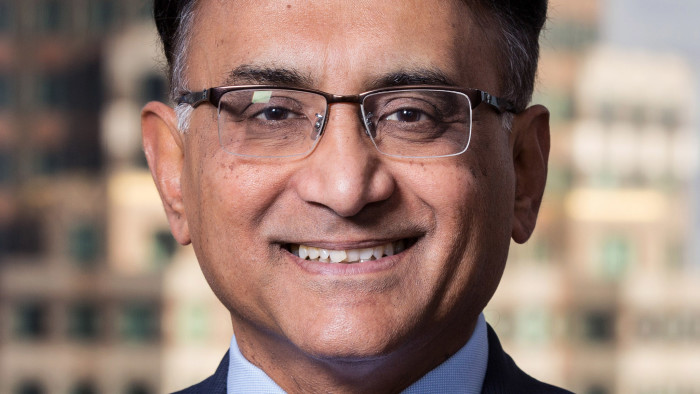Merrill Lynch’s Raj Sharma: the rise of an ‘accidental adviser’

Roula Khalaf, Editor of the FT, selects her favourite stories in this weekly newsletter.
Raj Sharma is a late bloomer, having started in financial advice in his 30s. He is, though, among the more successful broker-dealer advisers in the US, being only one of 19 individuals to have made it on to the elite list of the FT 400 since it started in 2013.
Mr Sharma, who calls himself an “accidental adviser”, deals with $7.2bn in client assets from his office in Boston, Massachusetts, where he moved from India in 1981. Before joining Merrill Lynch as an adviser in 1987, where he remains, he had been, among other roles, a disc jockey at an Indian radio station. He had also worked in marketing and TV production.
Mr Sharma recalls his early days at Merrill Lynch, when he took a “targeted approach” to building a practice by researching which industries and companies were doing well and targeting their employees as prospective clients. At that time, Aids research was competitive and considered lucrative.
“Every biotechnology company was trying to find a cure for Aids, and those companies were doing phenomenally in the stock market. I realised they were compensating their employees through stock options, and I saw an opening,” he says.
He says many of those employees did not understand how to maximise their stock options, so he researched the tax impact of options and the best time to exercise them. He walked into hospitals and companies, asking to be allowed to educate their employees on financial planning. As a sweetener, Mr Sharma put on lunch spreads for seminar attendees. “I never went there to sell products. I went there to become a resource for them,” he says.
The walk-in approach may not work for advisers these days, but there is still a need for financial education, he says. “Fundamentally, what our clients want is peace of mind,” he says. “I really believe we are in the business of giving peace of mind.”
Mr Sharma says there is too much information available to the investing public, “but not enough wisdom”. He believes investors seek out advisers because they want someone they can trust.
During the massive sell-off in US stocks in February, Mr Sharma and his team told their clients there was no need to panic. The advisers even encouraged some clients to rebalance their portfolios to take advantage of the sell-off. “We are opportunistic, as opposed to being fearful,” he says.
In times of volatility, Mr Sharma typically tells clients to “stop watching the markets every single day” because they “will not be retiring until 20 years from now”.
He is selective with clients these days, a far cry from when he was starting out. He takes on only those who open a minimum investment account of $5m. The average size of his client accounts is $15m.
Mr Sharma’s main priority is to continue to grow his practice “responsibly”, noting that adding seven to 10 clients a year would be ideal. “I want to pay attention to every client relationship and spend quality time with them. I don’t want to dilute that,” he says.
Mr Sharma says his immigrant background has also helped him become more appreciative of the circumstances of his clients — many of whom are entrepreneurs — and their need to protect and cultivate their wealth. He became an American citizen 24 years ago.
“Most of my clients have first-generation wealth, and that speaks to me as an immigrant,” he says.
Comments